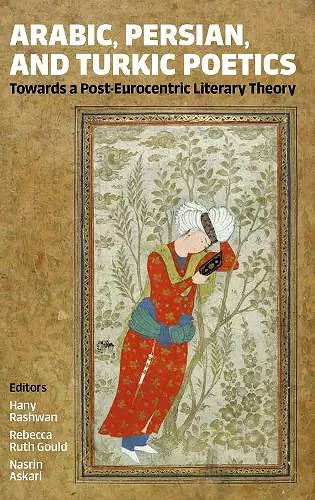Arabic, Persian, and Turkic Poetics
Towards a Post-Eurocentric Literary Theory
Rebecca Ruth Gould editor Hany Rashwan editor Nasrin Askari editor
Format:Hardback
Publisher:Oxford University Press
Published:19th Dec '24
Currently unavailable, and unfortunately no date known when it will be back

Arabic, Persian, and Turkic Poetics: Towards a Post-Eurocentric Literary Theory is a pioneering book that offers a fresh perspective on Arabic, Persian, and Turkic literature in their interrelations. The authors challenge Eurocentric paradigms while creating a framework for exploring these traditions on their own terms. Authored by an international team of scholars, each chapter centres the literary theoretical traditions of their respective literatures, with a focus on the discipline of comparative poetics ('ilm al-balāgha) in the Islamic world. By liberating the study of Islamicate literary texts from Eurocentric theoretical paradigms, the book paves the way for a more inclusive global discourse in literary studies. Specifically, our theoretical roots in comparative poetics and the rhetorical traditions of Arabic, Persian, and Turkic literatures will foster new methods of close reading that are in line with the aesthetic standards intrinsic to these texts and their traditions. Engaging and insightful, this book is essential reading for anyone interested in broadening their understanding of world literature and literary theory.
Arabic, Persian, and Turkish poetics are too often studied in isolation from one another, or in the stifling shadow of European poetics and European literary theory. This volume does the very opposite. It brings a series of important studies-by a wide-ranging, international cadre of scholars-of distinct and distinctive works from the Arabic, Persian, and Turkish traditions into conversation with each other. And, by excavating and foregrounding literary theoretical terms native and inherent to Arabic, Persian, and Turkish, it posits a literary theory that is both post-Eurocentric and non-Eurocentric. This will be required reading for anyone wishing to work within any of or across Arabic, Persian, and Turkish literature and poetic. * Shawkat M. Toorawa, Professor of Arabic and of Comparative Literature, Yale University *
If one thinks that Aristotle's Poetics and the traditional western trinity of drama, lyric, and epic must apply universally, one does not do justice to the Middle Eastern tradition. For Arabic, Persian, and Ottoman Turkish literature a different set of standards is valid and those literatures must be studied on their own terms. This volume is the first of its kind: an excellent and coherent collection of studies of literary theory and poetics in the premodern Islamic world, where each language has a literary tradition with its own character, but where central critical concepts are held in common. * Geert Jan van Gelder, Laudian Professor of Arabic Emeritus, University of Oxford *
With unparalleled depth and unyielding commitment to the rich terminologies and concepts inherent to Arabic, Persian, and Turkic literary traditions, it heralds a new dawn for post-Eurocentric literary theory. A clarion call to scholars, it invites them to venture beyond familiar horizons and immerse themselves in the multifaceted realm of Islamicate literary cultures. By placing indigenous poetics and theoretical frameworks at the forefront, it paves the way for scholarship that honors the cultural distinctions of these traditions while boldly engaging with the wider world of literary discourse. This is indispensable for those aspiring to truly comprehend Islamic poetics and champion a more inclusive and representative global literary theory. * Mohammad Salama, Professor and Associate Dean of Faculty, George Mason University *
This volume highlights rich traditions of pre-modern comparative practices which challenge the modernist, Eurocentric biases of the field. It transcends, through expert engagement with literature and theory in Arabic, Persian, and Turkish, the chronic inferiority complex towards Euro-American literary theory, which has kept these literary traditions captive, framed by imposed Western theoretical frameworks. The groundbreaking work in this volume resets the entire field of comparative literature, recognising the urgency of studying the literature of the Islamicate world on their own terms, not merely as passive subjects of study but as active and significant participants in the so-called field of World Literature and the study of the Humanities at large. * Huda Fakhreddine, Associate Professor of Arabic Literature, University of Pennsylvania *
A superb collection that details the distinctive characters of the Arabic, Persian, and Turkish literary traditions as well as the numerous and subtle ways in which they have interacted. With depth and nuance, this volume conveys the integrity and logic of a range of literary expression, with examples from the 10th to 20th centuries, in the three languages. In elucidating the conceptual and aesthetic underpinnings of these varied modes of expression in their own terms, this book represents a pioneering and much needed post-Eurocentric exploration of central literary categories of the Arabic, Persian, and Turkish traditions and elucidates what might be termed an Islamicate comparative poetics, enriching the repertoire available for developing a transnational and global literary theory. * Louise Marlow, Professor of Religion, Wellesley College *
ISBN: 9780197267790
Dimensions: 242mm x 163mm x 24mm
Weight: 680g
376 pages